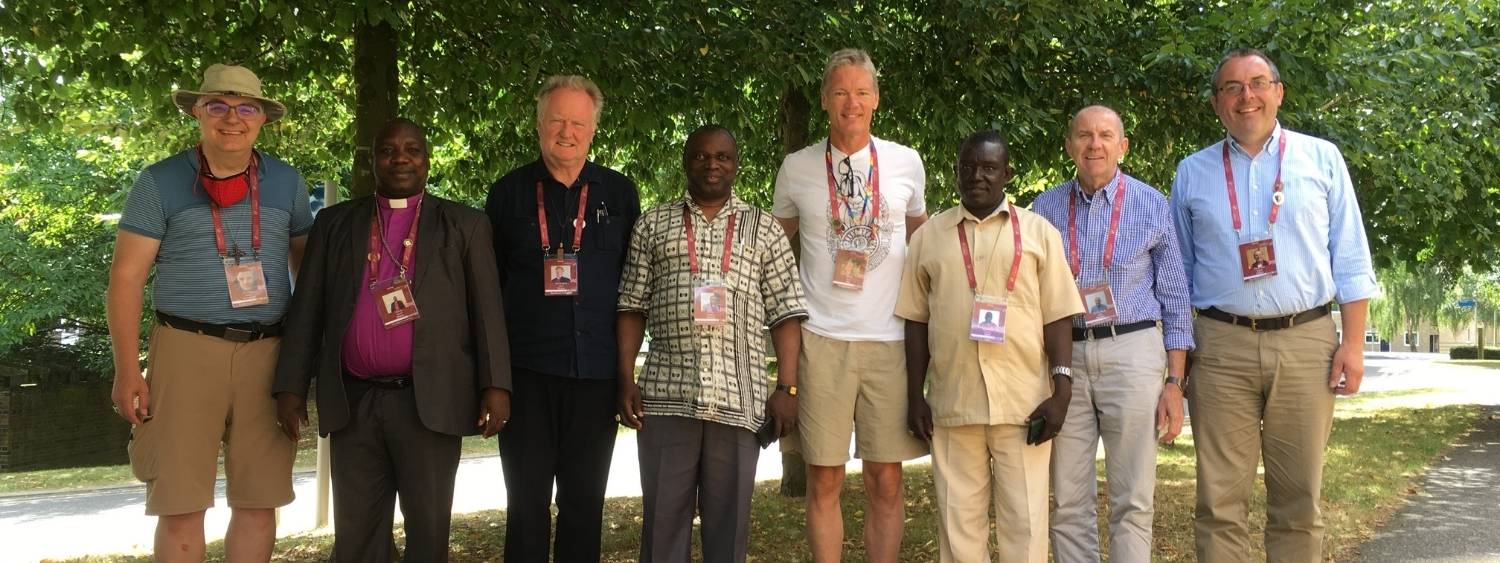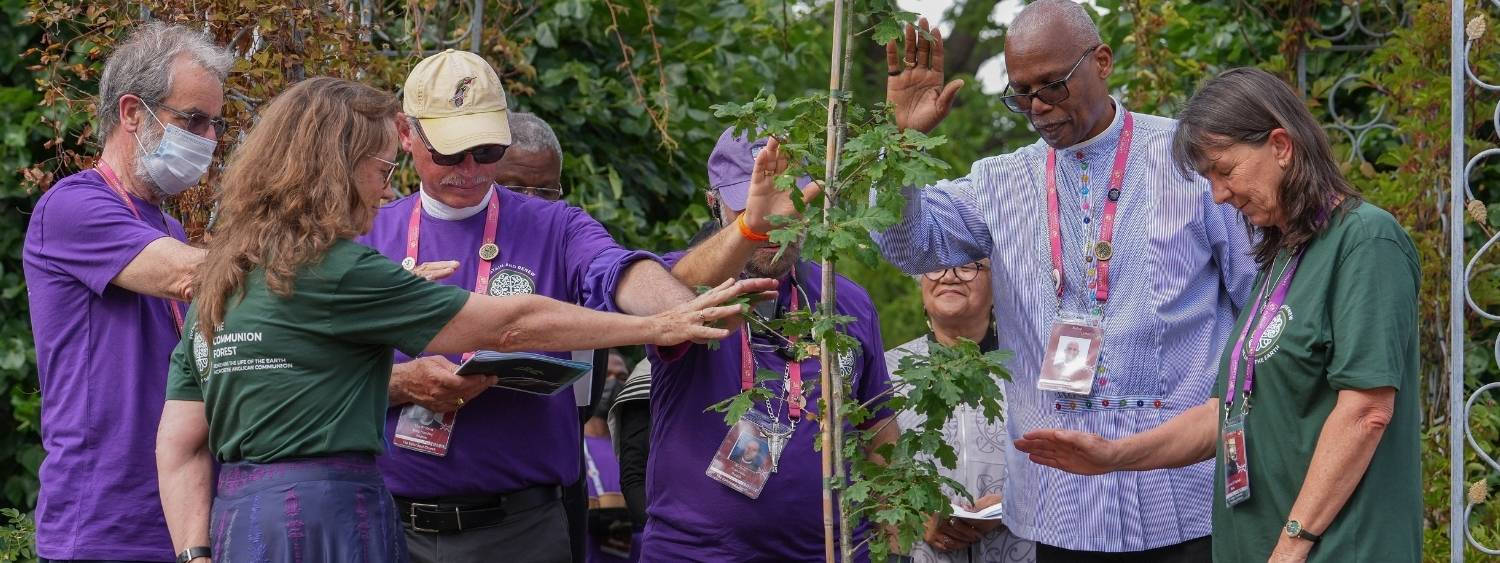“Exhilarating and exhausting!” – That’s been the response I’ve found myself automatically giving as people have asked me this week how I found the Lambeth Conference.
Exhilarating, because it was truly exciting to be part of a 650-strong cohort of bishops from across the globe, and to worship, study Scripture, eat, talk and play with colleagues – now friends – from across the worldwide Anglican communion. It has opened my eyes to the international nature of our church family to an extent that I simply had not appreciated before.
This international dimension was greatly helped by the fact that we were all part of a Bible study group of eight bishops, who met daily during the main part of the Conference to look at the book of 1 Peter, with a group study looking at the passage that had just been opened up for us by Archbishop Justin in his daily exposition. Listening to the descriptions of the situations in which our colleagues, particularly those from the developing world, have to live and minister was a truly humbling experience. For instance, Bishop Charles Ogeno, Bishop of Torit in South Sudan, described how, if he has a confirmation service tomorrow that is 20 miles away, he will leave today so that he can walk there in time.
Another of our group, Bishop Adolphe Mishindo Isesamo, Bishop of Nord Kivu in the DRC, described how the single thing that would make the most difference for ministry in his diocese would be the provision of portable sound systems and generators, so that his travelling clergy can lead outside meetings in the dozens of villages he has that have not yet heard the Gospel.

Bishop Gavin with bishops from South Sudan, the Democratic Republic of Congo, Kenya, Canada, the USA and England.
The same study group then met for the bishops’ plenary sessions, when we discussed the “Calls” – the resolutions on a series of key subjects that the Conference issued as challenges, statements of values and calls to action, to ourselves, to the wider church and to the societies and governments of our nations. These ranged from Mission and Evangelism, Discipleship, Safe Church, Anglican Identity, Reconciliation, Human Dignity, the Environment and Sustainable Development, Christian Unity, Interfaith Relationships and Science and Faith. I loved the fact that most of the Calls started with us as bishops calling and committing ourselves to take specific action, before then turning to the church and the wider world with a Call/challenge in that arena also. This seemed to me to be a healthy and a Biblical approach, with change starting with ourselves first, before then being in a position to issue a challenge to those around us.
The Calls process was an unusual one, in that we were not passing formal Resolutions (as had been the case with previous Lambeth Conferences), but rather were committing ourselves, and calling the dioceses we serve and the societies of which we are a part, to take needed action in these key areas of our life, ministry and discipleship. Inevitably, the Call on Human Dignity (which, among other things, covered issues to do with sexuality) received by far the most attention, both before the conference and during it. Here I was impressed that while acknowledging clear and strongly held differences of conviction by bishops and others in different parts of the Anglican Communion, the very clear and strong sense of fellowship and commitment to one another as part together of the body of Christ that ran throughout the Conference, meant that there was a very strong desire by all present to listen, respect and understand one another’s views and to commit to walking together in fellowship and mutual love and support, and not to divide or fragment. These strong differences of conviction were evident not only between different provinces, as they are perhaps somewhat simplistically portrayed in the press and on social media, but in all cases within them as well, with several African bishops expressing to me their strong desire to remain in full communion. Evident too was our mutual growing understanding that the very different cultural and societal situations in which we are ministering means that the unchanging Gospel needs to be applied and communicated in particular ways as we proclaim and demonstrate the love of God in our particular contexts.
Beyond the main “working part” of the Conference, other highlights for me included the two day retreat that we shared together before the Conference proper. This was at Canterbury Cathedral, with talks and reflections on the Conference’s key book of 1 Peter led by a range of international Biblical scholars, led by Oxford Diocese’s own Professor Jenn Strawbridge. We also had a truly unforgettable day at Lambeth Palace during which the “Communion Forest” was launched, with its first tree planted by the Archbishop of Canterbury. This initiative is a major project to help renew the life of the earth across the Anglican Communion – do expect to hear much more about this over the coming months.
 The evening programme during the Conference included the opportunity to take part in a candlelit prayer pilgrimage in Canterbury Cathedral, with members of the Cathedral Chapter opening up much of the spiritual life of this amazing building. Over the course of the 12 day programme, Archbishop Justin and Mrs Caroline Welby invited every bishop and our spouses to dinner at the Old Palace, an occasion that wonderfully underlined the sense of Lambeth being a gathering called and hosted by our Archbishop as a focus point as one of the formal Anglican Instruments of Communion. This was a wonderful evening, though Christina and I were very aware that hosting such a gathering each night meant that the Conference, for Archbishop Justin, was even more demanding and draining than it was for the rest of us.
The evening programme during the Conference included the opportunity to take part in a candlelit prayer pilgrimage in Canterbury Cathedral, with members of the Cathedral Chapter opening up much of the spiritual life of this amazing building. Over the course of the 12 day programme, Archbishop Justin and Mrs Caroline Welby invited every bishop and our spouses to dinner at the Old Palace, an occasion that wonderfully underlined the sense of Lambeth being a gathering called and hosted by our Archbishop as a focus point as one of the formal Anglican Instruments of Communion. This was a wonderful evening, though Christina and I were very aware that hosting such a gathering each night meant that the Conference, for Archbishop Justin, was even more demanding and draining than it was for the rest of us.
My reflections a week on from Lambeth is that it was a privilege to attend such a remarkable gathering, and it is a privilege to continue as part of this wonderfully diverse, vibrant, committed and passionate church. I have come away with what will be life-long friends – our Bible study group is continuing as a WhatsApp group so that we can support and pray for one another.
And I have come away with the renewed and strengthened conviction that this part of the body of Christ that we call the Anglican Communion is a family who need each other, who love each other, and who are committed to walking together with one another – difficult and challenging though at times that may be – as we worship God, as we proclaim the Gospel and as we play our part in stewarding and safeguarding creation. I give thanks for the Lambeth Conference, and I give thanks for the worldwide Anglican Communion which it represents.
